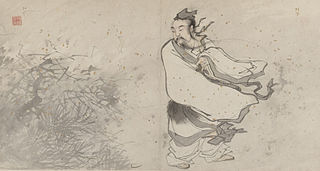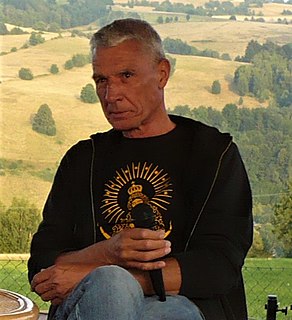A Quote by Geshe Kelsang Gyatso
Our world does not exist from its own side--like a dream world, it is a mere appearance to our mind. In dreams we can see and touch our dream world, but when we wake up we realize that it is simply a projection of our mind and had no existence outside our mind. In the same way, the world we see when we are awake is simply a projection of our mind and has no existence outside our mind.
Related Quotes
Knowledge is inherent in man; no knowledge comes from outside; it is all inside. We say Newton discovered gravitation. Was it sitting anywhere waiting for him? It was in his own mind; the time came and he found it out. All knowledge that the world has ever received comes from the mind; the infinite library of the universe is in our own mind. The external world is simply the suggestion, the occasion, which sets you to study your own mind.
I am fond of reminding my yoga students of the saying "It takes one to know one" when they become lost I condemnation and judgment of others. The world that we perceive is a reflection of our own states of mind and reveals our own level of consciousness. The world is little more than a Rorschach blot in which we see our own desire systems projected. We see what we want to see. (116)
Identification with the body, with the mind, with our possessions, with our families, with our friends - any kind of identification takes you outwards. All your possessions will be outwards: your wife, your husband, your children, your body - your body is outside you; your mind - your mind is outside you. The only thing that is not outside you is the witnessing. Just the watchfulness - that is your buddha. Identification means losing witnessing, falling into the trap of attachment. That is our misery, that is our slavery.
An affectionate disposition not only makes the mind more peaceful
and calm, but it affects our body in a positive way too. On the
other hand, hatred, jealousy and fear upset our peace of mind, make
us agitated and affect our body adversely. Even our body needs peace
of mind and is not suited to agitation. This shows that an
appreciation for peace of mind is in our blood.
Nothing other people do is because of you. It is because of themselves. All people live in their own dream, in their own mind; they are in a completely different world from the one we live in. When we take something personally, we make the assumption that they know what is in our world, and we try to impose our world on their world.
When you meditate, what you actually do is to enter into a calm or still, silent mind. We have to be fully aware of the arrival and attack of thoughts. That is to say, we shall not allow any thought, divine or undivine, good or bad, to enter into our mind. Our mind should be absolutely silent. Then we have to go deep within; there we have to observe our real existence.
Self-absorption in all its forms kills empathy, let alone compassion. When we focus on ourselves, our world contracts as our problems and preoccupations loom large. But when we focus on others, our world expands. Our own problems drift to the periphery of the mind and so seem smaller, and we increase our capacity for connection - or compassionate action.
The purpose of spiritual life is not to create some special state of mind. A state of mind is always temporary. The purpose is to work directly with the most primary elements of our body and our mind, to see the ways we get trapped by our fears, desires, and anger, to learn directly our capacity for freedom.
Mind dissolves only when you don't choose. And when there is no mind, you are for the first time in your crystal clarity, for the first time in your original freshness. For the first time your real face is encountered. Mind is not there - the divider. Now existence appears as one. Mind has dropped; the barrier between you and existence is no more. Now you can look at existence with no mind. This is how a sage is born. With the mind - the world. With no mind - freedom, MOKSHA, KAIVALYA, NIRVANA. Cessation of the mind is cessation of the world.

































